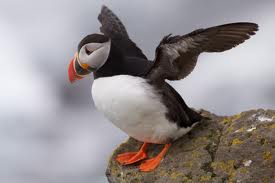.jpg) |
| Wirdsmit Group members at the Brownie Cottage |
And it is no wonder the group continues to attract interest and support, for the quality of work that they produce never fails to impress.
Below is a small selection of clips from the two workshops members of the group have taken part in in the past few weeks. Thank you to those who have given permission for your work to be quoted.
May the group grow and flourish and the young folk continue to develop their writing.
'The Fin Not the Shark'
In the workshop in Stromness Library, Alan Bissett led a session on holding back in writing, keeping your reader guessing and wondering, so that they will go on reading. More effective, he told them, citing the film Jaws, to 'show the fin not the shark'. Here are two beginnings that show the young students learned the lesson well.
Fire licked at Orion’s feet, and yet he still did not
move. Smoke billowed around him, rising far into the sky, tainting the clear
mountain air. A crow screamed, shooting out of a burning tree. Orion stood
still, rooted to the spot, feeling the flames creep up his torso, lighting up
the forest round about him. Eventually the raging heat engulfed his head, and
he was plunged into darkness. Aisling Philips
***
The question I had wanted to ask my parents for years
pounded inside my head.
‘Mum?’, I asked cautiously.
‘Yes dear?’
But that was it, my confidence gone.
‘Doesn’t matter.’
I twisted a lock of hair around my fingers in
discomfort. I guess I was scared, Writing Orkney Nature
A large part of writing is really looking at the world and paying close attention to detail. Two weeks ago a group of twelve young writers went to the Brownie Cottage to do just that, including those moving to Wirdsmit II. For them it marked the final time they would spend with the younger group members.
The trip fell within the week of the Orkney Nature Festival and with some help and advice from Sydney Gauld of OBRC and Gaby Barnby from Stromness Writing Group, Amber Connolly brought the youngsters to Orphir to look closely at Orkney nature and write about it.
An unknown flower and seed head
Tall yellow flowers, they feel soft and smooth. They
look like they only opened recently because at the top of the plant there are
still buds. The leaves look like small broccoli leaves. There is a gentle,
soft, sweet smell. It might have been wild though I doubt it.
I can remember when we first moved to Orkney I was
fascinated by flowers, after all there weren’t many in London
PS The flower/seed head was from a brussel sprout
plant, so a good guess!
***
Hen Harrier
Silent bird of prey
Swarming over our heads
Large and hungry, ready to strike
Down, down, further into nothingness.
A rat, no a hare
Captured in talons,
You clutch on, not letting go
Then disappear into the clouds.
Will you return one day?
Ellhana Welbon
***
Writing about a shell from the ‘lucky dip’
Shells
The hollow frame of the shell is cold and crumbles to
the touch.
It used to contain energetic life, the tiny animal
exploring the sea bed. But now it is no longer supporting life, it is dead and
dry.
It has been trampled underfoot without a thought and
has been mingled with the sand.
One day a young girl picks up the shell, takes it
home, and puts it outside her window.
Every day as she opens her curtains she looks at the
empty, lifeless husk.
Every day the vicious wind and rain lashes the old
shell, wearing it and crumbling it to pieces.
Every day the shell patiently waits.
***
Writing about a stone
Stone cold
Too cold to touch
Open to a new world
Nestled in the ground
Energy gone.
Megan Card
***






























































